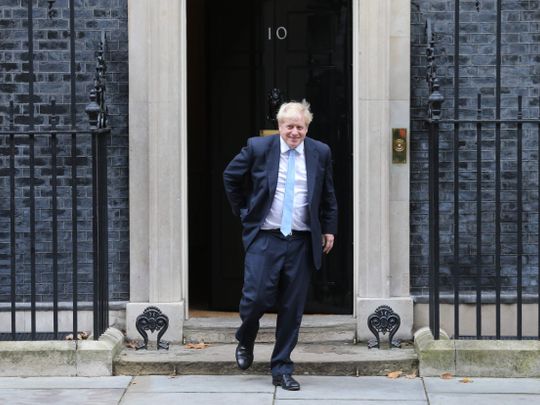
There is every indication that the government of the United Kingdom has reached political agreement with the European Union on the terms of Brexit, allowing Boris Johnson to claim political victory by leaving by the end of October.
The essential core element of the unfolding agreement is that Northern Ireland will remain inside the European customs union while England, Scotland and Wales will be outside. The effect of the agreement will mean that there will be no return of a hard border on the island of Ireland, that goods, services, people and everything will continue to move freely between the Republic of Ireland to the south and Northern Ireland.
The customs line will instead be drawn down the Irish Sea, separating the two islands.
For the Dublin government, if the deal is accepted — and with everything that’s at stake it would be utter madness if it is not — the Brexit agreement represents a diplomatic coup. There’s a general election due in the Republic of Ireland next Spring. The agreement provides a very considerable boost indeed to the re-election prospects of Leo Varadkar, Ireland’s Taoiseach or prime minister, and to his Fine Gael party.
Already, after meeting with Johnson in Liverpool last week to hammer out the basis for the deal when all had appeared dead in the water, Varadkar’s personal popularity ratings improved by 15 percentage points to 55 per cent.
Throughout this Brexit process — Varadkar and his point man, Foreign Minister Simon Coveney, had taken a very firm line, adamant that there could be no return to a hard border. Brussels agreed — and so too did the other 26 EU nations.
There was a risk that at any time, the British and their very persuasive Foreign and Commonwealth Office, would, could and did use every tactic in the book to undermine, divide and break that unity. Thankfully, it held firm — with Varadkar and Coveney remaining on focus, diplomatic, confident and persuasive.
Boris pulls out the proverbial rabbit
For Boris Johnson, this Brexit deal is a proverbial rabbit pulled out of a magician’s hat. He’s operating from a majority of minus 43 in the House of Commons, hasn’t win a vote of import there since becoming Prime Minister, and has suffered defeat after defeat both in the Commons and the courts. The Supreme Court found that he had misled Queen Elizabeth in suspending parliament, yet he has somehow managed to pull it all together, allowing him to lead the UK out by Halloween.
But with every political deal there are losers. And the sorest of those right now will be the Democratic Unionist party. Since Theresa May’s disastrous showing in the 2017 general election, the conservatives have had to rely on the 10 DUP MPs to govern.
That supply and confidence arrangement cost British taxpayers £1 billion (Dh4.66 billion) in a financial inducement that was nothing short of bribery extract by the DUP. And since then it has controlled the Brexit process, standing as an impediment to any deal. As far as it is concerned, Northern Ireland is no different than North Wembley, that Belfast is the same as Bristol in the UK.
This Brexit deal, however, finally shatters the century-old superiority complex worn in orange sashes and bowler hats by a party that has proven itself to be out of touch with the majority of voters in Northern Ireland who voted to Remain in the European Union. And ironically, the very political weakness of Boris Johnson loosened the temporary grip the DUP held on the Conservatives and its task of running the government.
Yes, Johnson will still have to get the deal past the European Research Group — the right-wing Eurosceptics that control his Conservatives. But would they really risk giving up on a deal and having to ask for an extension by law to that October 31 deadline for the sake of protecting the DUP? It’s one thing to talk about the integrity of the United Kingdom, another thing to support it at all costs when the hallowed chalice of Brexit is but on the lips of Jacob Rees-Mogg.
This Brexit deal, however, finally shatters the century-old superiority complex worn in orange sashes and bowler hats by a party that has proven itself to be out of touch with the majority of voters in Northern Ireland who voted to Remain in the European Union
Up in Scotland, Nicola Sturgeon will be looking at this deal and will see that customs line down the Irish Sea as a very good thing indeed. If that line is in the Irish Sea for now, it could certainly be redrawn to cover the border between an independent Scotland and England to its south. She can certainly make a very plausible argument that Scotland, which voted overwhelmingly to Remain, should be included in the European customs zone.
That’s an argument that will play well indeed to the majority of Scots now clamouring for a second independence referendum.
For Irish nationalists, a customs union on the island of Ireland represents a step closer to full economic and political unity. Continued prosperity linked to the south will only enhance the prospects of a positive outcome in a future poll on Northern Ireland’s status.
In Wales, Plaid Cymru, the Welsh nationalists will too get a boost from a union self-imploding.
That customs line now laid in the Irish Sea could very well undo the unity of the UK itself.
Note: A Brexit deal has been agreed between UK and EU negotiating teams before a meeting of European leaders in Brussels. Boris Johnson tweeted on Thursday: “We’ve got a great new deal that takes back control.” The two sides have been working on the legal text of a deal, but it will still need the approval of both the UK and European parliaments.








